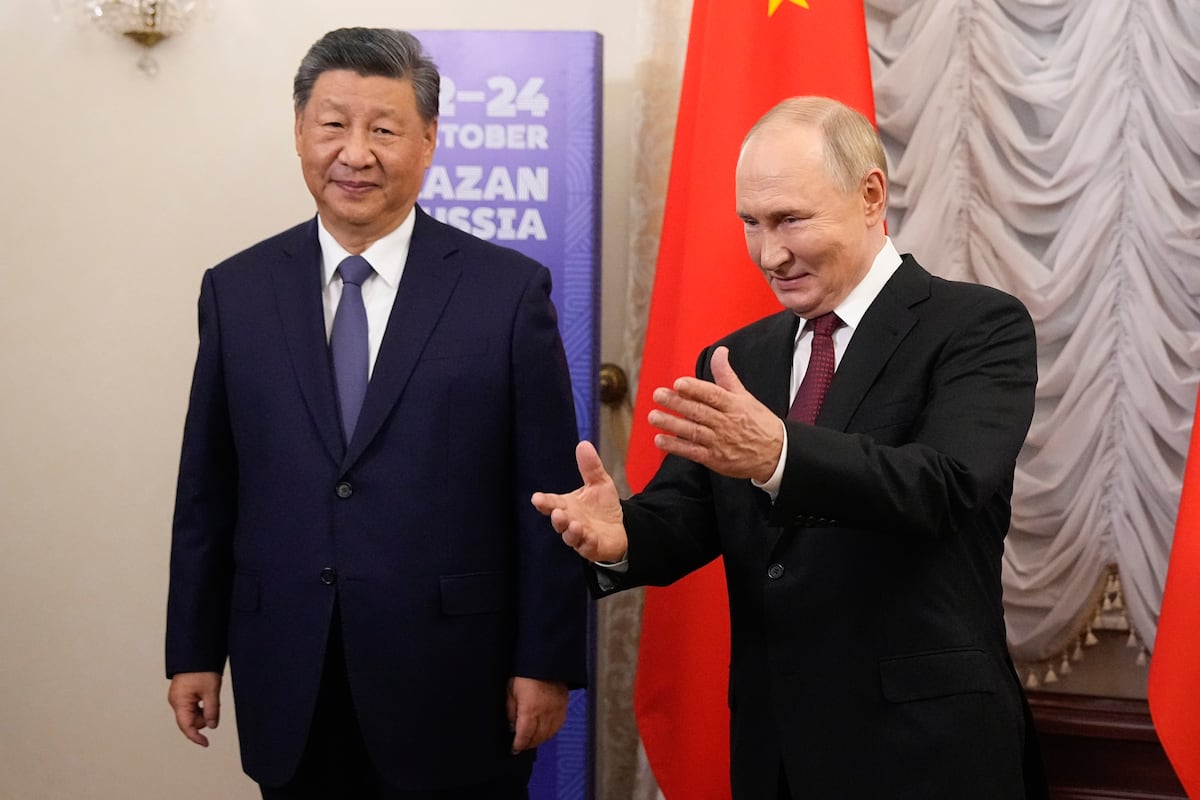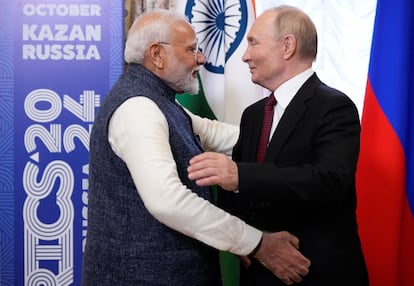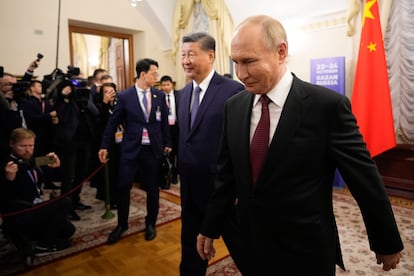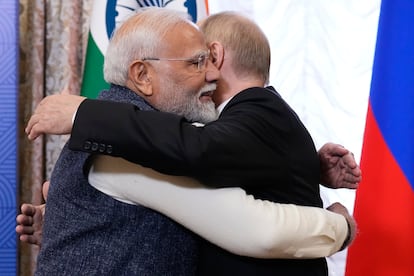Putin presents the BRICS platform in Russia as an alternative to Western hegemony. international

The sixteenth BRICS summit began this Tuesday in the Russian city of Kazan with its host Vladimir Putin with a clear objective in mind: strengthening a platform that offers Moscow an economic and diplomatic alternative to the West. The list invited by the Kremlin to this Tatar city on the banks of the Volga includes more than two dozen international leaders and delegations from 36 countries. They include UN Secretary-General Antonio Guterres, who will meet face-to-face with Putin on Thursday for the first time since the start of the Russian invasion of Ukraine in April 2022. The UN chief’s meeting with the Russian dictator, as well as his refusal to attend a peace summit in Switzerland – which Moscow also did not attend – have angered Volodymyr Zelensky’s government.
One of the Kremlin’s priorities for the BRICS forum, which runs until Thursday, is to boost a financial system that allows Russia to avoid Western sanctions over the war in Ukraine. “We are developing relevant platforms within the framework of this partnership. (…) Financial systems, payment instruments and investment mechanisms. The economic growth of BRICS members will depend less and less on external influences or intervention,” the Russian President declared at a meeting with the bloc’s businessmen on the eve of the summit. “The GDP of BRICS is higher than that of the G-7 (of which Moscow was a part until the illegal annexation of Crimea in 2014) and is continuously growing,” he claimed.
An intense agenda of meetings awaits Putin in these three days. This Tuesday, the Russian leader will meet with almost all the leaders of the main BRICS members: the Chinese President, Xi Jinping; Indian Prime Minister Narendra Modi; South African President, Cyril Ramaphosa; and Egypt’s leader, Abdel Fattah el-Sisi, whose country joined the forum last year. Brazilian President Luiz Inácio Lula da Silva could not attend the forum due to a domestic accident. Additionally, Putin plans to hold other bilateral meetings on Wednesday and Thursday with guests from countries that are not part of the grouping, including Turkish President Recep Tayyip Erdogan and a Palestinian delegation.

The Russian invasion of Ukraine is expected to feature at the planned meeting between Putin and Guterres on Thursday. This will be the second time that the Secretary General of the United Nations will visit Russia since the aggression began. On his last official visit two and a half years ago, Guterres had refuted the excuses with which the Russian President and his Foreign Minister, Sergei Lavrov, had justified that their “special military operation” could be protected by international law, Allegedly, to protect the population of the Ukrainian region of Donbass in the east of the country.
Guterres then warned, “In accordance with the resolutions adopted by the UN General Assembly, the Russian invasion of Ukraine is a violation of its territorial integrity and the Charter of the United Nations.” “I deeply believe that the sooner we end this war, the better it will be for the people of Ukraine, the people of Russia, and the world.”
However, the visit of the UN Secretary General to the BRICS summit has angered Kiev. “He rejected Ukraine’s invitation to the first global peace summit in Switzerland, but accepted war criminal Putin’s invitation to Kazan. The Ukrainian Foreign Ministry announced via the social network
At his daily press conference, Guterres’ spokesman, Stephane Dujarric, planned to note that “Once again, the Secretary-General will participate in the BRICS summit, which this year is being held in the Russian Federation.” Insiders at the institute say there will be “a lot of speculation” about a possible meeting with Putin, but the President’s office has nothing to say right now. According to the same sources, talks are also underway about a possible visit of Guterres to Ukraine.
infamous resignations
The BRICS summit in Kazan is the first in which the new members: Egypt, the United Arab Emirates, Ethiopia and Iran participate. Additionally, more than 20 countries have expressed interest in becoming part of the club at some point, although many have already rejected the idea. Among them, Argentina, after the arrival of Javier Meili to the presidency at the end of last year. Also this week, two states that the Kremlin considers its backyard: Armenia and Kazakhstan.
Armenia announced its withdrawal from the Collective Security Treaty Organization, Russia’s alternative to NATO, over the summer. Instead, the resignation of Kazakhstan – one of Russia’s main partners in other economic and political clubs such as the Commonwealth of Independent States and the Eurasian Union – has been more painful for the Kremlin. In response, Russian authorities have banned the import of a range of Kazakh vegetables under the weak pretext of guaranteeing their phytosanitary safety. The spokesman for the President of Kazakhstan concluded, “Kasym-Yomart Tokayev prefers the United Nations as a universal and non-alternative organization, in which all current international problems can and should be discussed.”
Another “ugly” for the Kremlin is Serbian President Aleksandar Vucic. The leader of the main Russian support in the center of Europe has refused to go to Kazan and, instead, will welcome Polish Prime Minister Donald Tusk in Belgrade this Wednesday.
A club with good intentions, but different interests
Even in China they doubt the real relevance of this club of nations. government media South China Morning Post On the eve of the Kazan summit, an analysis was published in which its author, Professor Jian Shixu of Macau University of Science and Technology, highlighted a number of problems facing the BRICS. “Can the BRICS speak with one voice? Even before its recent expansion, cooperation was hampered by a lack of consensus among its members on important issues. Now that it has more members, reaching consensus may be even more difficult,” he warned.
“Economic cooperation is easier said than done,” highlighted the Chinese newspaper, which does not consider the forum sufficient to adopt common financial measures because its members cooperate with either the West or India. Pointing to the US, which is one of its biggest regional rivals – or are part of other platforms with other interests such as Mercosur. Similarly, the expert highlighted the “immense political courage” required to make progress in the de-dollarization of the international economy.


Putin, who wanted to promote a single currency among the BRICS in 2022, has abandoned the idea. It now plans to launch an alternative banking payment system to SWIFT, from which it was expelled by the invasion of Ukraine. In fact, these mechanisms already exist, from cryptocurrencies to national payment systems. However, Moscow has found that Chinese banks have stopped cooperating to avoid problems with the United States, a country with which they have much more trade.
“It is becoming increasingly difficult to make payments and import parts from China,” an employee of a Russian gas company told this newspaper. “When a Chinese bank stops payments, we look to other, usually smaller regional institutions, but this is becoming increasingly complex.”
brix bridge
Moscow will insist on its partners to start widely using the BRICS Bridge payment system, the Finance Ministry informed the Russian press. “The global financial system is obsolete and not suitable for current challenges: it is subordinated to the interests of developed countries,” the Eurasian country’s economy department declared in a report published on the eve of the summit.
To expert Maria Snegovaya, from think tank CSIS, the boycott of the international financial system is just a kick in the pants for the Kremlin after the damage caused by the aggressive attack against Ukraine. “The same Russian elites that desperately tried to integrate themselves into these institutions for more than 20 years are now trying to destroy them with their own hands. The complete inability to analyze one’s own actions borders on madness,” Snegovaya says on her Telegram channel.
(Tagstotranslate) Russian war in Ukraine
